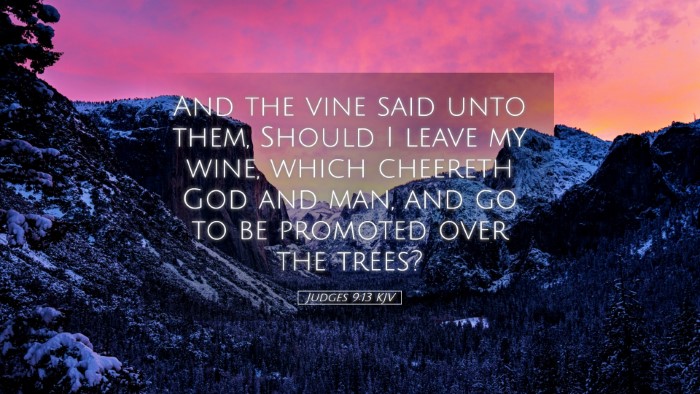Commentary on Judges 9:13
Judges 9:13 states: "But the vine said unto them, Should I leave my wine, which cheereth God and man, and go to be promoted over the trees?” This verse is pivotal in the parable of Jotham, conveying profound theological and moral truths through the metaphor of the vine.
Contextual Background
The narrative in Judges 9 follows the turbulent aftermath of Gideon's death, as Abimelech, one of his sons, seeks to establish himself as king over Shechem. Jotham, another son of Gideon, addresses the citizens through a parable, illustrating the folly of choosing a ruler.
Analysis of the Vine's Response
The vine's response in Judges 9:13 serves as a metaphor for the importance of remaining rooted in one’s purpose and calling. Here are some insights:
- Symbolism of the Vine: In biblical literature, the vine frequently symbolizes fruitfulness and joy. The vine represents not only sustenance but also pleasure, as its wine is seen to "cheer" both God and man.
- Divine Approval: The vine's reference to "cheering God" suggests that the Lord delights in the fruits of the earth that bring joy and satisfaction, both spiritually and physically. This indicates that spiritual leadership must be tied to the joy of serving God and humanity.
- The Danger of Ambition: The vine's refusal to leave its fruitful purpose for ambition speaks against the dangers of seeking power for personal gain. It encourages leaders to remain faithful to their God-given tasks rather than abandoning them for status.
Theological Implications
Applying the lessons from Judges 9:13 can yield important theological reflections:
- Life's Purpose: Each individual has a unique purpose ordained by God. Just as the vine highlights the importance of its wine, believers must not forget their spiritual gifts and contributions to the Kingdom.
- The Role of Leadership: Leaders should prioritize a life of service over ambition. The call to leadership should stem from a desire to glorify God rather than a mere pursuit of influence.
- Community Reflection: The parable urges communities to be discerning in their choice of leaders, emphasizing that those who are fruitful in their true vocation are better suited for positions of authority.
Insights from Public Domain Commentaries
Matthew Henry’s Commentary
Henry emphasizes that the vine is content in its role, highlighting its unwillingness to resign its identity for lordship. He remarks that the vine, although not a king among trees, provides something of far greater value — wine which brings joy. This suggests that true value is found in fulfilling one’s assigned role rather than aspiring to authority.
Albert Barnes’ Notes on the Bible
Barnes provides insights into the characteristic voices of the trees in Jotham's parable, with the vine symbolizing elevation of service over ambition. He outlines that wine, which 'cheers God and man', reflects the idea that joy and productivity come as a result of fulfilling one's purpose. Barnes urges readers to recognize that true leadership serves the needs of others rather than pursuing glory.
Adam Clarke’s Commentary
Clarke points out that the vine represents a spiritual dynamic, implying that Christian leaders ought to be conscious of what they abandon when they choose the pursuit of power. He articulates that the vine's question reflects a broader human dilemma — the temptation to forsake significant, fruitful labor for the bitter allure of authority.
Practical Applications
For pastors, students, and theologians, Judges 9:13 can be a source of guidance in various contexts:
- Pastoral Leadership: Pastors must embody the virtues of the vine by nurturing their congregation rather than seeking self-aggrandizement.
- Theological Education: Students should aspire to learn and grow in ways that contribute positively to the body of Christ, enhancing their ability to produce godly fruit.
- Community Engagement: Believers are called to engage communities through acts of service and love, mirroring the vine's production of joy rather than solely seeking leadership roles.
Conclusion
Judges 9:13 is more than a mere parable; it serves as a timeless reminder of the importance of purpose-driven leadership within the context of God's Kingdom. It compels believers to seek fulfillment in their callings while remaining wary of the seductive nature of power and authority.


